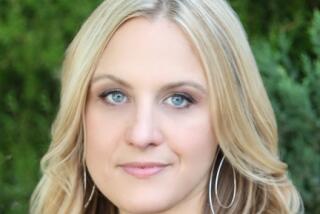Evangelicals Quietly Taking Up the Spirit of Lenten Sacrifice
- Share via
As Catholics and many Protestants began Lent--the pre-Easter season of sacrifice--this week, evangelical Christians prepared for two nationwide fasting observances.
But there has been no mention in the evangelical campaigns of the ancient Lenten tradition of repentant prayer and minimal meals that began with Ash Wednesday.
In keeping with a long-standing, unspoken avoidance of Catholic and historic Protestant traditions and rites, America’s burgeoning independent evangelical and charismatic churches almost never observe Lent or the Lenten season.
And yet, some experts say, evangelicals may be backing carefully into the spirit of Lent without actually saying so.
* Officials of World Vision, the relief agency based in Seattle, said they expected more than 600,000 American teenagers to participate in a 30-hour fast to identify with the world’s hungry children that began Friday. The annual late February event, which raised $5.2 million last year, “was not consciously chosen for Lent but it does happen to fall when we begin the run-up to the events of Easter,” said Robert Seiple, president of World Vision.
Teenagers from San Diego to Long Beach and from Glendora to Porter Ranch are among local church groups that planned to go without solid food during the fast and engage in service projects to aid the poor.
* Evangelical leaders Bill Bright and Pat Robertson are urging Christians to begin 40 days of fasting and prayer, starting Sunday, for moral and religious revival in America. The PrayUSA! idea was picked up from the nationwide Mission America coalition headed by the Rev. Paul Cedar of Cathedral City, who said the dates were chosen to fall within Lent--but felt no need to mention that publicly.
Even the 40-day period mimics Lenten tradition, except for the method of counting the days until Easter--which is April 12 this year for western Christianity.
Catholic and long-established Protestant churches observe Ash Wednesday as the first of 40 days, not counting Sundays, until Easter. The PrayUSA! leaders decided to observe 40 consecutive days of fasting and prayer, starting March 1 and ending April 9--the day before Good Friday, which recalls Jesus’ crucifixion.
Seiple admitted in an interview Tuesday that references to Lent were omitted from the two campaigns because of “a lot of leftover baggage that separates and divides” the older from younger Christian churches.
But Cedar attributed the avoidance of Lenten terms not to an overt anti-Catholic feeling but to a lack of knowledge of historic traditions among evangelicals. Many of the hoped-for 2 million participants in PrayUSA! “are in newer, often independent churches who are not tied to church history,” he said.
At a San Fernando Valley church where youths planned to participate in this weekend’s 30-hour famine, one retiree serving as a volunteer office worker said he thought that Lent was a Jewish holiday.
At another church, a young organizer said she believed that Lent was “something the Catholics do.”
Indeed, for many Baptists, Pentecostalists, Adventists and other members of so-called free churches, “Ash Wednesday is only that day when they see Catholics with ashes on their foreheads,” said Mel Robeck of Pasadena’s Fuller Theological Seminary.
“Most free churches would argue that Lent might be hypocritical--that Christians are asked to live a sacrificial life all year long and that setting aside a period of several weeks lets you off the rest of the year,” Robeck said.
Anti-Catholic sentiment in much of U.S. Protestantism from the late 19th century until the 1960s caused many independent churches to distance themselves from rites and observances linked strongly to Catholic origins, he said.
“In Louisiana, for instance, largely Catholic New Orleans celebrates Mardi Gras but generally Protestant Baton Rouge does not,” Robeck said.
Mardi Gras, which ends on Ash Wednesday, is based on the tradition in some Catholic countries of living it up just before Lenten austerity went into force.
Cultural and religious changes since the 1960s have softened free-church feelings about Catholics, and many of today’s evangelical seminary students are attracted to Catholic-style liturgy, ritual and ancient traditions, he said.
The growing evangelical Christian interest in fasting has been credited in part to the efforts of Bright, who founded Campus Crusade for Christ in 1951 at UCLA and now runs a variety of ministries from Orlando, Fla. Since 1994, Bright has extolled biblical examples of combining prayer with fasting in annual weekend rallies. When he received the $1-million Templeton Prize for Progress in Religion in 1996, he donated the money to promote fasting by organizing such rallies.
Committed U.S. Catholics, up to the age of 60, are obliged to fast on Ash Wednesday and Good Friday, In addition, Catholics 14 and older are asked to abstain from meat on Ash Wednesday and all Fridays during Lent, including Good Friday.
More to Read
Sign up for Essential California
The most important California stories and recommendations in your inbox every morning.
You may occasionally receive promotional content from the Los Angeles Times.











